| Reviews & Columns |
|
Reviews DVD TV on DVD Blu-ray 4K UHD International DVDs In Theaters Reviews by Studio Video Games Features Collector Series DVDs Easter Egg Database Interviews DVD Talk Radio Feature Articles Columns Anime Talk DVD Savant Horror DVDs The M.O.D. Squad Art House HD Talk Silent DVD
|
DVD Talk Forum |
|
|
| Resources |
|
DVD Price Search Customer Service #'s RCE Info Links |
|
Columns
|
|
|
Nothing But The Night (The Resurrection Syndicate)
A mildly diverting U.K. supernatural horror mystery...but that's all. Scorpion Releasing has released Nothing But the Night (known here in the States sometimes as The Resurrection Syndicate), the 1972 U.K. chiller starring Christopher Lee, Peter Cushing, Diana Dors, Keith Barron, and Georgia Brown. Long unavailable except for numerous VHS knock-offs and a Region 2 release in Japan, Scorpion's clean-looking disc should please Lee/Cushing completists and those horror/supernatural genre fans dedicated to seeing everything that came out of England from that particular time period. But a "lost classic" Nothing But the Night certainly is not; its few, few pleasures come mostly from satisfying one's curiosity about this long-discussed title. Some trailers for this Katarina's Nightmare Theater edition, but they won't decide a buy for you.
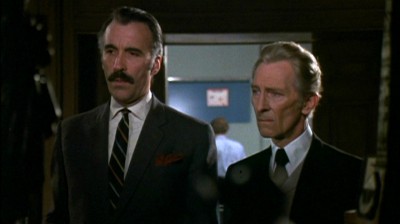
Dr. Peter Haynes (Keith Barron) is trying to figure out why little orphan Mary Valley (Gwyneth Strong) is having such horrific nightmares about catching on fire...when no such thing has happened to her. Involved in a freak bus accident where the driver caught on fire, Mary's nightmares may hold the key to why the bus crashed, but Haynes has to convince pathologist Sir. Mark Ashley (Peter Cushing) to intercede on his behalf with Lord Fawnlee (John Robinson). Fawnlee, one of the trustees of the mysterious Van Traylen Trust (which funds and operates Inver House, the remote Scottish orphanage where Mary lives), doesn't want Mary examined any further, but police investigator Colonel Charles Bingham (Christopher Lee) thinks there may be some kind of connection between Mary's plight and the fact that several suspicious "suicides" of Van Traylen trustees have taken place over the past few weeks. Reporter Joan Foster (Georgia Brown) smells a juicy story, and isn't adverse to cozying up to Dr. Haynes to get the scoop, but when she helps Haynes bring Mary's real mother into the picture―triple murderess and prostitute Anna Harb (Diana Dors)―all hell breaks loose, and soon Bingham and Ashley realize something very strange is going on at Inver House.
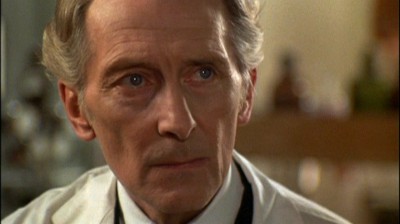
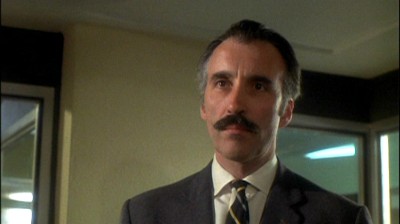
Nothing But the Night is a classic case of what I call an "allowance" title: you want to make allowances all over the place for it. For a variety of reasons, you want to bend over backward to excuse away its faults. After all, it stars the two crown princes of U.K. horror, Peter Cushing and Christopher Lee, two performers whose work in this genre have engendered a tremendous amount of good will from their legions of fans; ergo, whatever they appear into together just has to be better than most of the other stuff out at the same time. Nothing But the Night's story, taken from a novel by cult British horror/thriller writer John Blackburn (A Scent of New-Mown Hay, Bury Him Darkly, The Gaunt Woman), is quite intriguing on its own, mixing the supernatural with thriller and even medico-investigation elements, providing more than enough raw material for a suspenseful movie. The screenplay was written by Brian Hayles, of Doctor Who and Warlords of Atlantis fame, among many other TV and feature film sci-fi productions. The director, Peter Sasdy, was a well-regarded Hammer alumnus, with cult titles such as Taste the Blood of Dracula and Countess Dracula under his belt (with guilty pleasure The Lonely Lady soon to come). And Nothing But the Night's producer, the legendary Anthony Nelson Keys (The Curse of Frankenstein, The Brides of Dracula, The Stranglers of Bombay, Dracula: Prince of Darkness, among many, many more), specifically chose this project to inaugurate his newly-found film company (with star Christopher Lee), Charlemagne Productions (which promptly went belly-up after this effort flopped). All the elements seem aligned for a classic U.K. horror thriller.
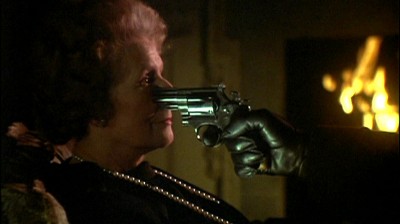
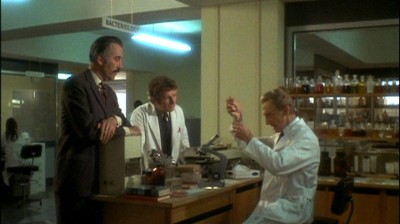
However, at the time of Nothing But the Night's 1972 U.K. release (it made it here to U.S. shores in 1975 under the rather strange title, The Resurrection Syndicate―it sounds like a mob movie), no one in particular liked it, not the critics nor the public, nor the director and star, who both felt the movie didn't work, nor Blackburn the original author, who felt his storyline and characters had been simplified right out of viewer interest. Were they all wrong back then? Of course, it's almost a prerequisite that cult films be rejected on their initial release by someone; that just adds to the enjoyment of a particular movie's "re-discoverers" who pat themselves on the back for seeing what everyone else somehow couldn't see (we've all done that). Add to that Nothing But the Night's tiny budget, which gets one rooting for the underdog production team doing more with less (another convenient "allowance" for any technical or continuity glitches), as well as its relative obscurity over the years (the anticipation factor can lead to over-praising, too; the viewer has invested so much energy in trying to track down the title―many times years doing so―that they can be unwilling to admit the movie is anything less than worth their efforts to see it and pre-love it), and how could Nothing But the Night be anything less than a misunderstood classic waiting to be rediscovered?
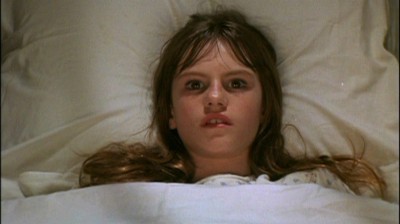
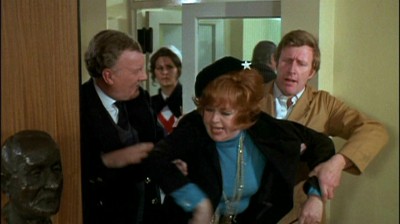
Unfortunately, just fitting into all those requirements doesn't automatically put the movie into "cult classic" status―it actually has to deliver the goods for the viewer (like similar classic, The Wicker Man)...and Nothing But the Night simply doesn't, no matter how much we may want it to. Despite the heavyweight talent in front of and behind the camera, almost every element comes up wanting: direction, screenplay, performances, production. Everything feels cheap and...hesitant, with an enervated pace that proves fatal right from the start. It's apparent that those involved with Nothing But the Night are trying for a slow, deliberate, "classy" (if you will) approach to the material, eschewing the increasingly vulgar, broad, and gory tone that marked the later U.K. entries from Amicus and Hammer. And that's fine...for awhile. But eventually, a movie like this must kick into gear; I don't care how "carefully" and "tastefully" it's been prepared―it's a thriller when all is said and done, so it better build up a head of steam, leading to a suitably thrilling ending. Instead, director Sasdy and his crew have difficulty setting an appropriately unnerving tone from minute one, with what little tension there is generated long since dissipated by the rushed, badly-directed, severely disappointing climax.
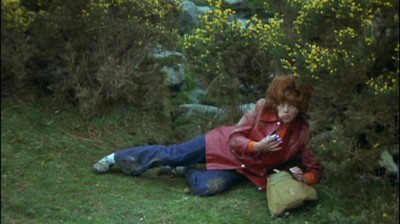
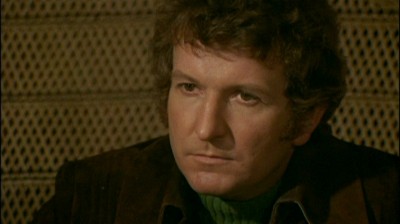
Sasdy seems all over the place when it comes to individual scenes, which work sometimes but more often than not, don't. The opening killings/"suicides" are a good example: the first one, a wide-eyed woman going over a cliff in a car, is distressingly familiar in execution; the man being pushed over a ledge is embarrassingly staged; the woman getting her head blown off is quite eerie...and then we're back to totally inept with the bus driver catching his sleeve on fire (that's all we get to see in this unconvincing scene―we don't even get to see the bus crash, no doubt a budget restraint). Sasdy, limited by the truncated, hap-hazard script, can't convince us that the movie's two main subplots are connected―the sinister Van Traylen Trust and their doings, and poor Diana Dors as a would-be killer―while the actors' individual scenes play out as if they're isolated from each other. SPOILERSIt should be easy for Sasdy to try and trick us into thinking that Dors may be coming to kill little Gwyneth; that kind of misdirected cross-cutting is Filmmaking 101, but here, the effect is laughable as he keeps cutting to the pursuing Dors rolling around in the mud and cramming chocolate into her face (let's just forget, too, how unconvincing her escape is, or how amusingly staged is the search for her). The effect isn't threatening or sinister, it's comical, at best, and thus becomes merely filler as we quickly suss-out the big supernatural/brainwashing mystery at Inver House. The twist finale, SPOILERSwhich should blow our socks off first with its revelation (which even my little kid figured out much too quickly) and then its sure-fire shocking depiction, is remarkably rushed and ill-conceived, with the little kids jumping off the cliff with a stolid solemnity that doesn't suggest perverted, evil self-sacrifice as much as over-trained tots dutifully performing their school play chores (Sasdy can't even correctly frame this supposedly horrifying last scene, and it's over before it even registers with us).
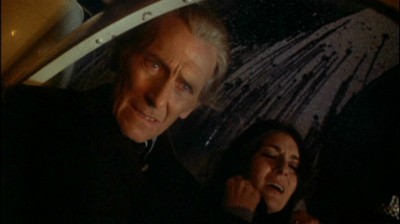
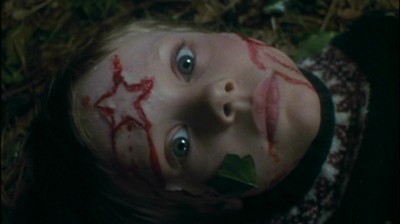
Dors (who could be used well if a director was careful) is horribly miscast here (she reminded me of that SCTV sketch where John Candy impersonated a starving, out-of-control Shelley Winters), displaying no subtlety or menace of purpose in her loud, flat-footed portrayal. Georgia Brown, the U.K. singer/actress, is awkward in her seduction scenes with equally non-plussed Keith Barron; their opening section fades from memory the minute we realize their filler isn't really important to the story. Cushing and Lee, pros to the end, don't exactly embarrass themselves in Nothing But the Night, but neither do they accomplish anything in the least bit memorable or distinct, either, from their many other similar genre appearances, with Cushing's character seeming rather undeservingly sharp and angry (perhaps understandable considering Cushing had recently lost his beloved wife), and Lee smooth and silky as ever...without a bit of interest or spark creeping into his careful, dull characterization. Only little Gwyneth Strong manages to put forth a compelling performance, particularly during her early nightmare scenes. If the filmmakers wanted Nothing But the Night to be a more reserved, thoughtful U.K. horror/supernatural thriller, it's a pity they didn't focus more attention on Strong's character, exploring her descent into brainwashed/transference hell, before becoming a cold-eyed killer, rather than spending all that time on boring Barron and Brown, bored Cushing and Lee, and bowled-over Dors.
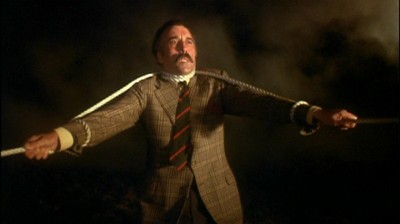
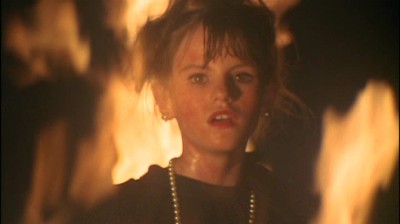
The DVD:
The Video:
The anamorphically-enhanced, 1.78:1 widescreen transfer for Nothing But the Night looks a lot better than the pan-and-scan VHS I saw years and years ago (it may be a little tight at times at that ratio), with a rather sharp image, okay color (muddy at times, but I suspect that's the original cinematography), a reasonably bright picture (again, dark at times, but that's the film's look), and no compression issues.
The Audio:
The Dolby Digital English mono audio track is serviceable, with relatively clean dialogue, and just faint hiss. No subtitles or close-captions available.
The Extras:
You can watch Nothing But the Night with bookend bumpers featuring Katarina Leigh Waters, who is apparently some kind of wrestler. As a fairly stacked wrestler with an attractive English accent, she can put me in a sleeper hold anytime, but as a movie hostess, she's no Elvira, that's for sure. Some text liner notes are helpful, and original trailers for The Devil Within Her, Humongous, Final Exam, and The Stinkubus The Incubus (Cassavetes!!!) are included.
Final Thoughts:
Everyone was right when Nothing But the Night came out: it's not particularly very good. I've had more than my fair share of "allowance" movies, and nobody wanted to come back to Nothing But the Night after having seen it years ago on a crappy VHS copy, and "rediscover" its true worth. Unfortunately...it's just not that good of a horror/suspenser, with a piecemeal script, good actors phoning it in, and direction that can't generate even a modicum of tension. Nothing But the Night is a "skip it" for general audiences, but fans of the genre and Cushing/Lee will want to "rent it" for completion purposes.
Paul Mavis is an internationally published film and television historian, a member of the Online Film Critics Society, and the author of The Espionage Filmography.


|
| Popular Reviews |
| Sponsored Links |
|
|
| Sponsored Links |
|
|
| Release List | Reviews | Shop | Newsletter | Forum | DVD Giveaways | Blu-Ray | Advertise |
|
Copyright 2024 DVDTalk.com All Rights Reserved. Legal Info, Privacy Policy, Terms of Use,
Manage Preferences,
Your Privacy Choices | |||||||














